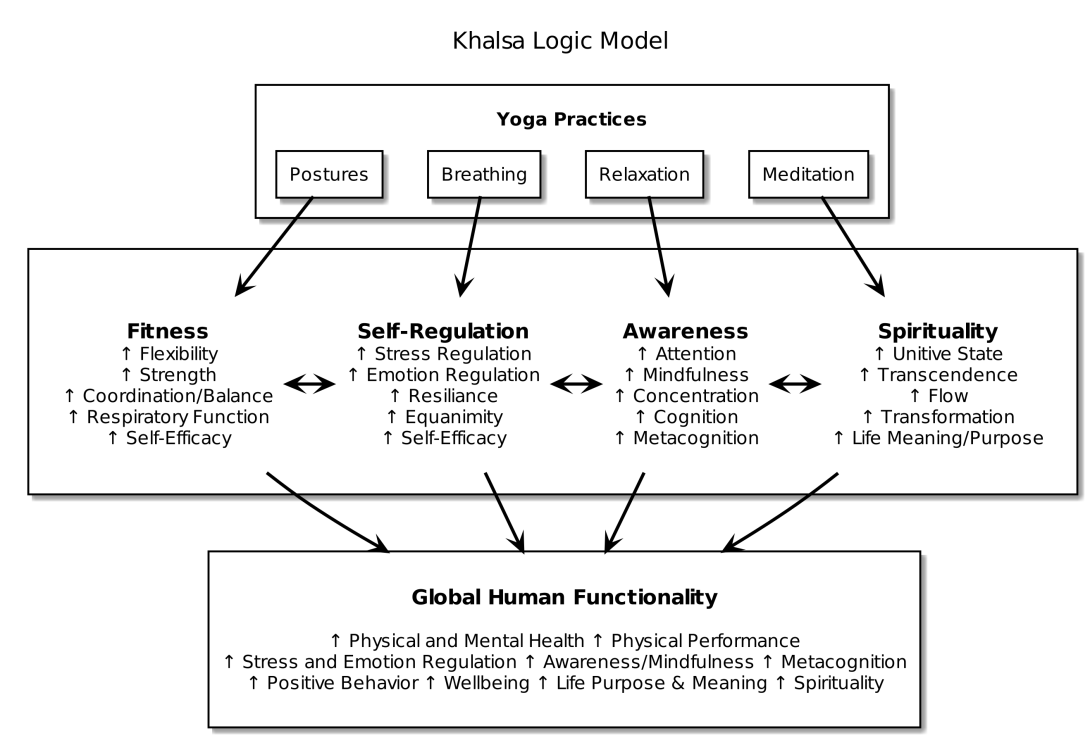Yoga changes lives. That’s not hyperbole. Over the years, research has linked yoga practice with increased well-being, lower inflammation, and improved sleep, attention, and mood. These benefits often result from regular postures, breathing exercises, and meditation.
A growing body of evidence maps how yoga supports global human functioning, as Khalsa’s logic model nicely summarizes:

But the science usually stops short. It tells us that yoga works, but not always why. The deeper teachings that guide how we live, speak, and relate to others often get left out of the conversation.
Where Are the Ethics?
Most yoga research overlooks the ethical foundation laid out in the first two limbs of the 8-limb path. Instead, studies tend to isolate postures (asana), breathwork (pranayama), and meditation (dhyana), treating yoga as a collection of techniques for physical and mental wellness.
Even in many yoga teacher training programs, conversations about truthfulness, wise speech, or mindful consumption often get sidelined in favor of modules on anatomy, sequencing, or branding.
I teach two weekly yoga classes at a city-owned building alongside Zumba, Pump, and other fitness programs—most of which make no mention of ethics. And across the country, in community centers and gyms, it’s easy to see how yoga can be reduced to just another form of exercise. Not wrong, just incomplete.
In my experience, those two missing limbs matter.
Researchers have their reasons for skipping them. The yamas (social ethics) and niyamas (personal observances) are harder to standardize across trials, more difficult to measure, and more likely to bump up against cultural or religious sensitivities. And truthfully, many scientists and even yoga instructors simply haven’t studied or practiced the yamas and niyamas deeply enough to speak about them with confidence.
But that doesn’t make them less essential.
And if you already have a spiritual practice, you don’t need to replace it. The Yoga Sutras can complement and enrich other paths. They don’t ask for your allegiance, just your attention.
Real-Life Practices
As you may have noticed, the yamas and niyamas show up in all sorts of unexpected ways in my life, from how I enjoy my coffee to how I use social media or go for a walk. On good days, I get curious: Do I really need this, or am I just hoarding comfort?
When I first started practicing asteya (non-stealing), I thought of the obvious things: plagiarism, under-tipping, interrupting. But over time, I began to see the subtler ways I stole time from my kids by multitasking, or attention from my partner by checking notifications.
Yoga ethics don’t shame me. They gently reveal where I’m still clinging.
Here’s another example. A few years ago, I started learning Spanish using a well-known gamified app. At first, I felt excited. I pictured myself chatting with my kids in Spanish—both of whom are fluent. But over time, I noticed a shift. Some days, I complete lessons without even reading the prompts. The ritual has become more about extending my 2,439-day streak than actually learning. Practicing aparigraha (non-grasping) helps me notice the tightness in my body when I reach for my phone.
The language app is just one example. Again and again, these teachings reveal the places in my life where I’m still holding on.
Ethics That Nourish, Not Punish
Some people hear the word “ethics” and brace for rules or dogma. But the yoga path doesn’t demand perfection. The niyama of santosha (contentment) invites gratitude. The yama of ahimsa (non-harming) begins with compassion for yourself and others.
You don’t have to overhaul your life. A small act done mindfully plants a seed.
Ethical practice in yoga isn’t about judgment or measuring up. It’s about becoming more aware of how your actions affect the world. It asks, gently: What are you nurturing? What are you letting go? It might look like choosing your words with care, taking a breath before reacting, or offering a quiet yes when someone needs help.
These aren’t grand gestures. But when rooted in care, even the smallest choices can sustain you. They don’t deplete your energy, they restore it. Over time, if you’re paying attention, they can shape a life that feels more aligned, more spacious, and more kind.
Walking the Path Together
Ethical living can feel lonely. I’ve sat in yoga classes that celebrated “positive vibes only” while ignoring injustice. I’ve heard sermons that called for love without naming the systems that divide us.
It helps to find companions who welcome questions, not just answers. People who talk about hard choices with humility. People who sit together in silence, then share soup and stories.
I don’t claim to live these values perfectly. Far from it! But each day that I sit, move, and listen, they feel more real.
Yoga Beyond the Mat
Yoga calls us to act from love. The yamas and niyamas offer one way to practice that calling in everyday life. Not by checking boxes, but by noticing. Choosing. Pausing. Letting go.
No app will track that kind of streak. But it builds a life with fewer regrets and more integrity.
And sometimes, that’s enough.
I would love to hear your stories about living by yoga’s ethics, or some ways that we could explore the yamas and niyamas together.

Comments